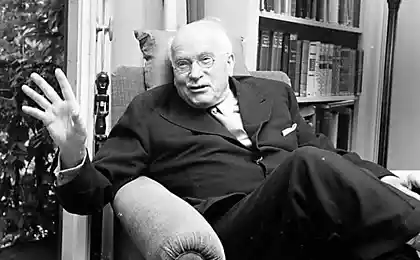283
8 Things That Make You Who You Are

Each of us is a unique universe. We often wonder what makes us special. Why do we react to situations this way and not otherwise? Where do our talents, fears and preferences come from? The answer lies in the complex interplay of many factors that shape our personality.
Modern psychology and neuroscience prove that personality is much more complex than just the result of upbringing or genetic predisposition. It is a multifaceted structure created at the intersection of biological, psychological and social factors.
Understanding the components that shape our personality is the key to conscious self-knowledge and personal growth. When we know what influences our behavior and thinking, we have the tools to make positive changes.
1. Genetic foundation
At a basic level, we start with the genetic code, a unique combination of DNA from our parents. Studies of twins show that up to 40-60% of basic personality traits can be inherited.
Genes affect traits such as extraversion, anxiety, openness to experience, and temperament. However, it is important to understand that genes create a predisposition, not a final decision.
How to work with the genetic basis:
- Study the family history and characteristics of relatives - this will help to recognize inherited traits
- Understand your genetic predispositions to work more effectively with them, not against them.
- Even strong genetic tendencies can be corrected through conscious practices and new habits.
2. Early childhood experiences
The first years of life have a huge impact on the formation of personality. During this period, the brain is most plastic and susceptible to external influences. Research shows that key attachment patterns, basic trust in the world, and fundamental beliefs are formed before age 7.
Relationships with primary caregivers create templates for all future interactions. Secure attachment in early childhood is associated with higher emotional intelligence and psychological resilience in adulthood.
According to a study published in the journal Nature Neuroscience, the quality of interaction in the first three years of life directly affects the development of neural connections responsible for emotional regulation and social functioning.

3. Cultural environment and social environment
The culture in which we grow creates a context for personal development. It defines norms, values, acceptable ways of expressing emotions, and even how we perceive ourselves relative to others.
Different cultures influence the formation of such aspects of personality as individualism or collectivism, attitude to hierarchy, tolerance to uncertainty, orientation to long-term goals. Studies of cross-cultural psychology show that the same personality traits can be manifested and interpreted differently depending on the cultural context.
In addition to culture as a whole, we are influenced by specific social groups - family, school, peers, work collective. Social psychologists call this the “microsystem effect,” where each group we belong to contributes to shaping our identity.
Practical recommendations:
- Expand the cultural experience through travel, learning other languages and traditions – it enriches the personality
- Analyze the impact of different social groups on your beliefs and values
- Consciously choose an environment that promotes your positive development.
4. Significant life events
Critical life events often become turning points that change the trajectory of personal development. These can be both traumatic experiences (loss of loved ones, serious illnesses, natural disasters) and positive transformative experiences (travel, significant achievements, meetings with outstanding people).
According to post-traumatic growth studies, even deeply traumatic events can lead to positive personality changes - the development of resilience, empathy, reassessment of values. The key factor here is not the event itself, but how one interprets it and integrates it into one’s life story.
Neurobiological studies show that emotionally significant events are recorded in memory through enhanced activation of the amygdala and hippocampus, making such memories more vivid and influential for personality formation.
5. Education and intellectual development
Formal and informal learning doesn’t just give us knowledge; it literally shapes our brains, developing certain cognitive abilities and creating neural networks. What and how we learn influences our thought patterns, problem-solving, and worldview.
Studies show that education affects such aspects of personality as critical thinking, openness to new experiences, cognitive flexibility. Different disciplines develop different types of intelligence: mathematics trains logical thinking, art – emotional intelligence and creativity, language learning – communication skills and intercultural competence.
How to use education for personal development:
- Go beyond your professional specialization by studying a variety of disciplines
- Practice a metacognitive approach – analyze not only what you learn, but how you do it.
- Use different learning formats: reading, audio, video, practical experiments, teaching others

6. Personal choice and self-determination
Despite the influence of external factors, we are not just passive products of genes and environment. Our ability to make informed choices, set goals and make efforts to achieve them actively shapes personality. The theory of self-determination, developed by psychologists Edward Desi and Richard Ryan, emphasizes the importance of autonomy, competence and connectedness for healthy personality development.
When we take responsibility for our lives and make choices that align with our core values, we not only express our identity, but shape it. Every decision, every action, creates a micro-change in the neural connections of the brain, gradually transforming who we are.
Research in neuroplasticity proves that our brain continues to change throughout life. What we practice regularly and focus on becomes literally part of our neuroscience and therefore our personality.
7. Relationships and interpersonal relationships
Interpersonal relationships are a powerful factor in the formation of personality. From romantic partners to friends, colleagues and mentors, every person in our lives leaves an imprint on our psychological structure.
Through relationships, we get feedback about ourselves, learn new perspectives, adopt behaviors, values, and even speech patterns. The concept of the “social mirror” proposed by Charles Cooley describes how self-image is formed through the reactions of others.
Close, trusting relationships are especially important. Research shows that the quality of our attachments affects stress levels, emotional regulation, and even physical health, which in turn affects personality traits.
Recommendations for development through relationships:
- Create a diverse social circle – people with different experiences and views expand your horizons
- Develop deep listening and empathy skills to make the most of your interactions with others
- Regularly analyze how your relationships affect your sense of self and behavior.
8. Internal dialogue and self-interpretation
The way we think about our life and tell it to ourselves profoundly affects the formation of personality. Narrative psychology studies how people create life stories that give meaning to their experiences. These internal narratives shape identity, influence emotional states, and guide behavior.
Studies show that people who are able to integrate even negative experiences into a coherent, meaningful life story show greater psychological stability and life satisfaction. The internal dialogue does not simply reflect the personality; it actively creates it.
According to the work of psychologist James Pennebaker, the very expression and structuring of experience through writing or internal narrative has a transformative effect on personality, improving psychological and physical well-being.
Conclusion: Harmony of many factors
Personality is the result of a complex interaction of all the factors described above. Just as a symphony emerges from a combination of different instruments, our individuality is shaped at the intersection of genetics, upbringing, culture, education, life experiences, relationships, and personal choices.
Understanding these components gives us greater awareness and freedom. We can be more compassionate about ourselves, recognizing the influence of factors we have not chosen, while at the same time taking responsibility for those aspects that are under our control.
Ultimately, the value of a person is not in his perfection, but in the unique combination of qualities that make each of us unique. When we accept and integrate all the parts of ourselves—inherited, acquired, and consciously created—we become more holistic and authentic.
Glossary
Neuroplasticity
The ability of the nervous system to change its structure and function in response to experience, learning, or injury. Thanks to neuroplasticity, the brain can form new neural connections throughout life.
Attachment theory
A psychological concept that describes the dynamics of long-term relationships between people. The main types of attachment (safe, anxious, avoidant, disorganized) are formed in early childhood and affect adult relationships.
Post-traumatic growth
Positive psychological changes that can result from dealing with highly traumatic or life-threatening circumstances. It involves reassessing values, developing new opportunities and deepening relationships.
Self-determination theory
A psychological theory of motivation that emphasizes the importance of meeting basic psychological needs for autonomy, competence, and connectedness for optimal functioning and growth.
Narrative psychology
A field in psychology that studies how people use stories and narratives to give meaning to their experiences and form identity. It focuses on life stories as the basis of human understanding and self-perception.
Emotional intelligence
The ability to recognize, understand and manage one’s emotions, and to interact effectively with others’ emotions. Includes self-awareness, self-control, empathy and social interaction skills.
Cognitive flexibility
The ability to adapt thinking and behavior to new, unexpected or changing situations. It involves the ability to switch between different concepts, view problems from different perspectives, and adapt to change.
What books to read to understand this world. List from Zubarev
Dynamic Meditation: The Path to Harmony of Body and Mind























